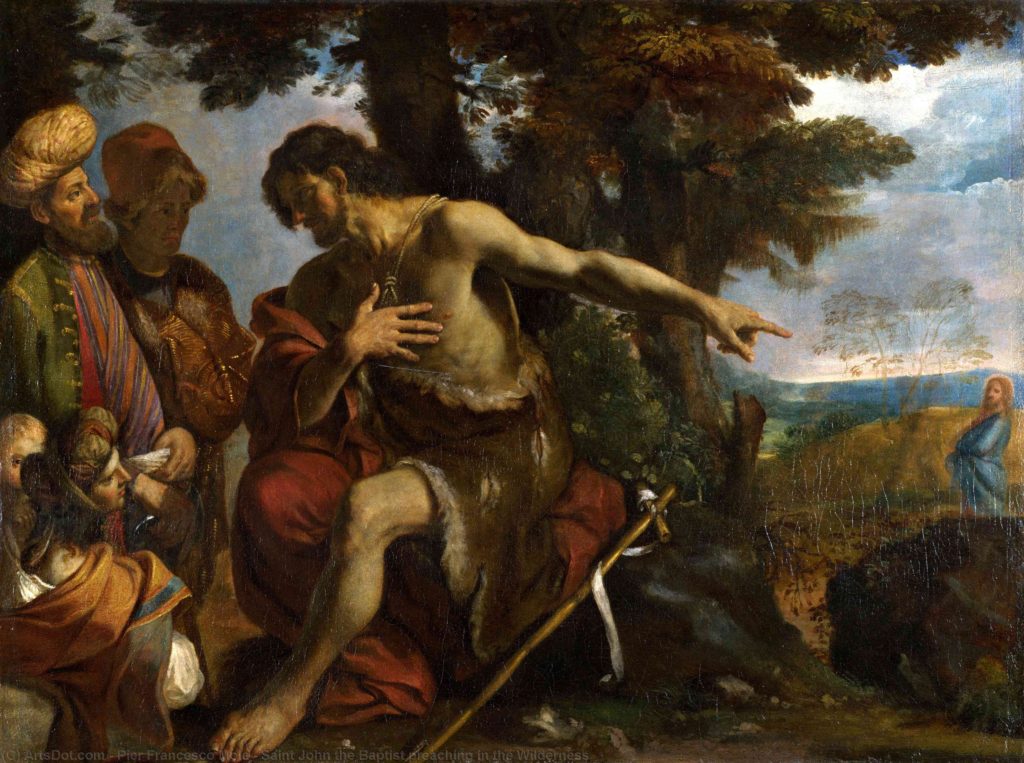John the Baptist Preaching
Pier Francesco Mola
Mount Calvary Church
Eutaw Street and Madison Avenue
Baltimore, Maryland
A Roman Catholic Parish
The Personal Ordinariate of the Chair of S. Peter
Rev. Albert Scharbach, Pastor
December 16, 2018
Advent III
Gaudete Sunday
Sung Mass
10 A.M.
____________________
Common
Merbecke
____________________
Organ Prelude
Organ Postlude
____________________
Anthems
Anon. (Previously attributed to Henry Purcell)
Rejoice in the Lord alway, and again I say, rejoice! Let your softness be known unto all men; the Lord is even at hand. Be careful for nothing, but in all prayer and supplication, let your petitions be manifest unto God, with giving of thanks. And the peace of God which passeth all understanding keep your hearts and minds through Christ Jesu, Amen.
The Choir of Westminster Abbey
__________
Giovanni Pierluigi da Palestrina (1525-1594)
Fuit homo missus a Deo, cui nomen erat Joannes. Hic venit in testimonium, ut testimonium perhiberet de lumine, et pararet Domino plebem perfectam.
There was a man sent from God, whose name was John. This man came as a witness, to give testimony about the light, and to prepare for the Lord a perfect people.
____________________
Hymns
The advent of our King (ST THOMAS-WILLIAMS) is by Charles Coffin (1676-1749), translated by John Chandler (1806-1876). This Latin hymn, Instantis adventum Dei, was sung at the Nocturn in Advent. Coffin was the rector of the University of Pars and as a Jansenist opposed the papal bull Unigenitus, which was viewed as an attack of the prerogatives of the French church. Chandler was an Anglican cleric and a prolific translator of Latin hymns.
The hymn evokes the coming of Jesus at his birth, but also his coming into Jerusalem on Palm Sunday, and his coming in judgement and glory at the end of time. We are reminded to be the faithful Zion, unlike the one that turned on Jesus and crucified him. By repentance we put away the old man and put on the new man in the image of our crucified and risen Savior.
__________
Comfort, comfort ye my people (Tröstet, tröstet meine Lieben) was written by Johann Olearius (1611–1684), a Lutheran pastor at Halle and translated by Catherine Winkworth (1827–1878). The hymn is a paraphrase of Isaiah 40:1-5, in which the prophet looks forward to the coming of Christ. More specifically, the coming of the forerunner of Christ – John the Baptist – is foretold. Though Isaiah’s voice crying in the desert is anonymous, the third stanza ties this prophecy and one from Malachi (Malachi 4:5) to a New Testament fulfillment. “For Elijah’s voice is crying In the desert far and near” brings to mind Jesus’ statement, “’But I tell you that Elijah has already come.’ Then the disciples understood that he was speaking to them of John the Baptist.”
The tune GENEVAN 42 is an adaptation by Louis Bourgeois (1510–1559) of a tune by Claude Goudimel (1501–1572), a French Calvinist who was killed in the St. Bartholomew’s Day Massacre.
__________
Hark, a thrilling voice is sounding is a translation by Edward Caswell (1814–1878) of the Latin hymn, Vox clara ecce intonat. It is based on Romans 13: 11-1. We hear that “Christ is near”; in response, we “cast away the works of darkness.” Advent is not a passive season but demands something from us. We sing of “The Lamb, so long expected, comes with pardon down from heaven. Let us haste, with tears of sorrow, one and all, to be forgiven.” Advent, like Lent, is a season of repentance, and repentance involves action. Just as Christ came 2,000 years ago, we know he can come again even tomorrow as the next stanza reminds us, “So when next He comes in glory and the world is wrapped in fear, He will shield us with His mercy and with words of love draw near.” By confession and repentance, we prepare to meet the Lord.
